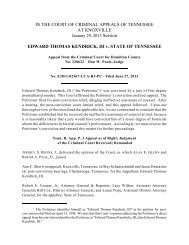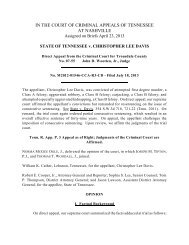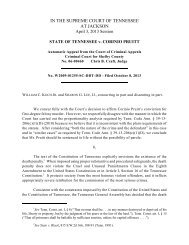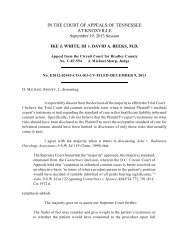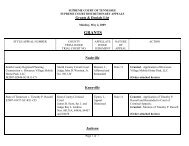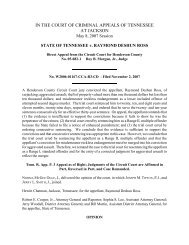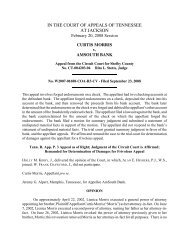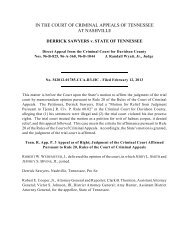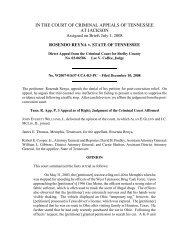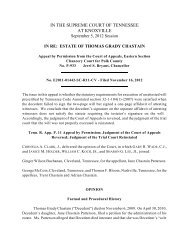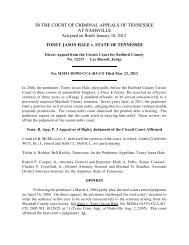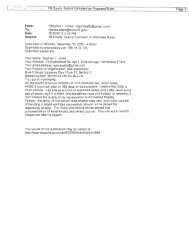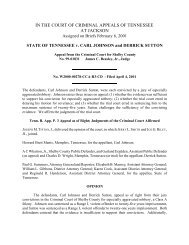James G. Akers v. Sessions Paving Company et al - Tennessee ...
James G. Akers v. Sessions Paving Company et al - Tennessee ...
James G. Akers v. Sessions Paving Company et al - Tennessee ...
You also want an ePaper? Increase the reach of your titles
YUMPU automatically turns print PDFs into web optimized ePapers that Google loves.
IN THE COURT OF APPEALS OF TENNESSEE<br />
AT NASHVILLE<br />
July 11, 2013 Session<br />
JAMES G. AKERS v. SESSIONS PAVING COMPANY ET AL.<br />
Appe<strong>al</strong> from the Chancery Court for Hickman County<br />
No. 11-CV-4530 Robbie T. Be<strong>al</strong>, Chancellor<br />
No. M2012-02602-COA-R3-CV - Filed August 13, 2013<br />
This action arises out of the <strong>al</strong>leged breach of a construction subcontract due to the gener<strong>al</strong><br />
contractor’s failure to pay for work performed by the subcontractor. At issue in this appe<strong>al</strong><br />
are the plaintiff’s two claims against the gener<strong>al</strong> contractor and the insurer that provided the<br />
performance and payment bond. One claim is for breach of the subcontract; the other is for<br />
violation of the Prompt Pay Act, <strong>Tennessee</strong> Code Annotated §§ 66-34-101 through -703. The<br />
tri<strong>al</strong> court granted the defendants’ motion for summary judgment finding that both claims<br />
were time-barred by <strong>Tennessee</strong> Code Annotated § 28-3-109(a)(3), the six-year statute of<br />
limitations for breach of contract. We affirm.<br />
Tenn. R. App. P. 3 Appe<strong>al</strong> as of Right; Judgment of the Chancery Court Affirmed<br />
FRANK G. CLEMENT, JR., J., delivered the opinion of the Court, in which ANDY D. BENNETT<br />
and RICHARD H. DINKINS, J.J., joined.<br />
<strong>James</strong> G. <strong>Akers</strong>, Brentwood, <strong>Tennessee</strong>, Pro Se.<br />
David K. Taylor and Max Smith, Nashville, <strong>Tennessee</strong>, for the appellees, <strong>Sessions</strong> <strong>Paving</strong><br />
<strong>Company</strong> and Great American Insurance Co.<br />
OPINION<br />
In 2004, the Town of Centerville, <strong>Tennessee</strong> solicited bids for the expansion and<br />
improvement of its Municip<strong>al</strong> Airport. One of the defendants, <strong>Sessions</strong> <strong>Paving</strong> <strong>Company</strong><br />
(“<strong>Sessions</strong> <strong>Paving</strong>”), was the successful bidder and was awarded the contract to manage and<br />
oversee the construction of the project in early September. The contract was for $523,841.60.<br />
On September 15, 2004, <strong>Sessions</strong> <strong>Paving</strong> entered into a subcontract with <strong>Akers</strong> &<br />
<strong>Akers</strong> of <strong>Tennessee</strong>, Inc. (“<strong>Akers</strong>”) pursuant to which <strong>Akers</strong> would perform specific clearing
and excavation activities on the construction site, and the company president, Mr. <strong>James</strong> G.<br />
<strong>Akers</strong>, would serve as Project Superintendent for <strong>Sessions</strong> <strong>Paving</strong>, in consideration for a tot<strong>al</strong><br />
fee of $112,153.40.<br />
<strong>Akers</strong> commenced work on September 21, 2004, and shortly thereafter encountered<br />
unexpected problems with the soil which Mr. <strong>Akers</strong> believed would require substanti<strong>al</strong>ly<br />
more time, resources and costs than the parties had origin<strong>al</strong>ly agreed upon. As a result, Mr.<br />
<strong>Akers</strong> requested that <strong>Sessions</strong> <strong>Paving</strong> amend the contract to provide for addition<strong>al</strong><br />
compensation to <strong>Akers</strong>. Over the next three months, <strong>Akers</strong> continued to work on the project<br />
while the parties attempted to re-negotiate the subcontract, but the negotiations were<br />
unsuccessful. During this period, <strong>Sessions</strong> <strong>Paving</strong> remitted progress payments to <strong>Akers</strong> that<br />
were substanti<strong>al</strong>ly less than what Mr. <strong>Akers</strong> believed <strong>Akers</strong> was owed. <strong>Akers</strong> suspended<br />
work on December 13, 2004, when it became apparent that it was not going to be<br />
compensated for what it believed to be work in excess of that it contracted to do. <strong>Akers</strong> never<br />
worked on the project after December 13, 2004.<br />
Over the next few months, Mr. <strong>Akers</strong> continued to ask <strong>Sessions</strong> for addition<strong>al</strong><br />
compensation for the work <strong>Akers</strong> performed on the airport project. On March 4, 2005, <strong>Akers</strong>,<br />
<strong>Sessions</strong> <strong>Paving</strong>, and the Town of Centerville entered into a s<strong>et</strong>tlement agreement, which<br />
provided that an independent third party would ev<strong>al</strong>uate and d<strong>et</strong>ermine a fair price for the<br />
work performed by <strong>Akers</strong>. Mr. <strong>Akers</strong> signed the agreement on beh<strong>al</strong>f of <strong>Akers</strong>. One week<br />
later, on March 12, 2005, Mr. <strong>Akers</strong>, acting on beh<strong>al</strong>f of <strong>Akers</strong>, filed a construction lien on<br />
the airport project in the Hickman County Register’s Office, stating <strong>Akers</strong> was owed<br />
$46,627.77.<br />
On August 9, 2011, more than six years after entering into the s<strong>et</strong>tlement agreement<br />
and filing the construction lien, Mr. <strong>Akers</strong> notified <strong>Sessions</strong> <strong>Paving</strong> that he was the<br />
successor-in-interest to the corporation’s (<strong>Akers</strong>’) rights under the subcontract and the<br />
1<br />
construction lien. He <strong>al</strong>so informed <strong>Sessions</strong> <strong>Paving</strong> that if it did not pay him $765,058.71<br />
by August 19 ($61,117.70 under the contract, plus statutory pen<strong>al</strong>ties and interest accruing<br />
since 2005), he would file a complaint for violation of the <strong>Tennessee</strong> Prompt Pay Act and<br />
for breach of contract.<br />
<strong>Sessions</strong> <strong>Paving</strong> refused his demands; thus, on August 24, Mr. <strong>Akers</strong> (hereafter,<br />
“Plaintiff”) commenced this action against <strong>Sessions</strong> <strong>Paving</strong> and Great American Insurance<br />
<strong>Akers</strong>.<br />
1<br />
The defendants do not ch<strong>al</strong>lenge Mr. <strong>Akers</strong>’ claim that he is the successor-in-interest to <strong>Akers</strong> &<br />
-2-
2<br />
<strong>Company</strong> (collectively, “Defendants”). Defendants filed a joint Answer on November 22.<br />
After taking discovery, Defendants filed a joint motion for summary judgment, asserting that<br />
Plaintiff’s claims were time-barred. By Order entered October 16, 2012, the tri<strong>al</strong> court<br />
granted Defendants’ motion for summary judgment. The court found that the six-year breach<br />
of contract statute of limitations applied to <strong>al</strong>l of the claims. The court <strong>al</strong>so found that<br />
Plaintiff was “clearly and fully aware that there was a potenti<strong>al</strong> claim for breach of contract<br />
under its subcontract with <strong>Sessions</strong>” on March 4, 2005, when Plaintiff entered into the<br />
s<strong>et</strong>tlement agreement with <strong>Sessions</strong> <strong>Paving</strong> and the Town of Centerville, or at the latest<br />
March 12, 2005, when Plaintiff filed a construction lien on the airport project with the<br />
Hickman County Register of Deeds. Based upon the above undisputed facts, the tri<strong>al</strong> court<br />
concluded the August 9, 2011 complaint was untimely and, therefore, dismissed <strong>al</strong>l claims<br />
3<br />
against Defendants. Plaintiff filed a timely appe<strong>al</strong> and Statement of the Evidence.<br />
ANALYSIS<br />
Plaintiff raises two issues on appe<strong>al</strong>, both of which ch<strong>al</strong>lenge the tri<strong>al</strong> court’s<br />
d<strong>et</strong>ermination that his claims are time barred by the six-year statute of limitations for breach<br />
of contract actions s<strong>et</strong> forth in <strong>Tennessee</strong> Code Annotated § 28-3-109(a)(3). First, he<br />
contends that his Prompt Pay Act claims are not subject to the six-year statute of limitations.<br />
Second, he contends that the tri<strong>al</strong> court erred in finding that his claims accrued more than six<br />
years prior to the commencement of this action.<br />
I. Summary Judgment<br />
This appe<strong>al</strong> arises from the grant of summary judgment, which is appropriate when<br />
a party establishes that there is no genuine issue as to any materi<strong>al</strong> fact and that a judgment<br />
may be rendered as a matter of law. Tenn. R. Civ. P. 56.04; Stov<strong>al</strong>l v. Clarke, 113 S.W.3d<br />
715, 721 (Tenn. 2003). It is appropriate in virtu<strong>al</strong>ly <strong>al</strong>l civil cases that can be resolved on the<br />
basis of leg<strong>al</strong> issues <strong>al</strong>one. Byrd v. H<strong>al</strong>l, 847 S.W.2d 208, 210 (Tenn. 1993); Pendl<strong>et</strong>on v.<br />
Mills, 73 S.W.3d 115, 121 (Tenn. Ct. App. 2001). Wh<strong>et</strong>her a claim should be dismissed<br />
based on the statute of limitations is a question of law, which we review de novo with no<br />
presumption of correctness. Redwing v. Catholic Bishop Diocese of Memphis, 363 S.W.3d<br />
436, 456 (Tenn. 2012) (citing Fahrner v. SW Mfg., Inc., 48 S.W.3d 141, 144 (Tenn. 2001)).<br />
2<br />
Plaintiff <strong>al</strong>so asserted claims against two other defendants, the Town of Centerville, and<br />
Meriweather Lewis Electric <strong>Company</strong>. The claims against those defendants are not at issue in this appe<strong>al</strong>.<br />
3<br />
Pursuant to <strong>Tennessee</strong> Rule of Civil Procedure 54.02, the tri<strong>al</strong> court <strong>al</strong>so found “there is no just<br />
reason for delay,” and directed that the Order be entered as a fin<strong>al</strong> judgment, notwithstanding Plaintiff's<br />
claims against the Town of Centerville and Meriweather Lewis Electric <strong>Company</strong>.<br />
-3-
II. The Prompt Pay Act<br />
Section 301 of the <strong>Tennessee</strong> Prompt Pay Act provides that “[p]erformance by a<br />
subcontractor, materi<strong>al</strong>man or furnisher in accordance with the provisions of such person’s<br />
written contract with a contractor for improvement of re<strong>al</strong> property sh<strong>al</strong>l entitle such person<br />
to payment from the contractor.” Tenn. Code Ann. § 66-34-301. The Prompt Pay Act does<br />
not specify a limitations period for such claims, therefore, we must d<strong>et</strong>ermine the applicable<br />
statute of limitations “according to the gravamen of the complaint.” Vance v. Schulder, 547<br />
S.W.2d 927, 931 (Tenn. 1977).<br />
“In d<strong>et</strong>ermining the gravamen, or re<strong>al</strong> purpose of an action, the court must look to the<br />
basis for which damages are sought.” Keller v. Colgems-EMI Music, Inc., 924 S.W.2d 357,<br />
359 (Tenn. Ct. App. 1996) (citing Bland v. Smith, 277 S.W.2d 377, 379 (Tenn. 1955)). The<br />
<strong>Tennessee</strong> Prompt Pay Act explicitly applies to disputes over commerci<strong>al</strong> construction<br />
contracts. See Tenn. Code Ann. §§ 66-34-103(a) (“All construction contracts on any project<br />
in this state, both public and private, may provide for the withholding of r<strong>et</strong>ainage . . . .”); -<br />
201 (“Performance by a contractor in accordance with the provisions of a written contract<br />
with an owner . . . .”); -301 (“Performance by a subcontractor, materi<strong>al</strong>man or furnisher in<br />
accordance with the provisions of such person’s written contract with a contractor . . . .”).<br />
Thus, commerci<strong>al</strong> construction claims arising under the Prompt Pay Act are grounded in<br />
contract. Further, it is readily apparent from the record that the basis for Plaintiff’s claim<br />
under the Prompt Pay Act is that Defendants failed to pay for work performed by <strong>Akers</strong> on<br />
the commerci<strong>al</strong> construction project. Therefore, we have concluded, as the tri<strong>al</strong> court did, that<br />
the six-year statute of limitations for breach of contract claims, <strong>Tennessee</strong> Code Annotated<br />
§ 28-3-109(a)(3), applies to Plaintiff’s claims under the Prompt Pay Act.<br />
III. Statute of Limitations for Breach of Contract Claims<br />
A breach of contract gives rise to a cause of action by the aggrieved party, and the<br />
statute of limitations for a breach of contract action begins to run “on the date of the breach.”<br />
Greene v. THGC, Inc., 915 S.W.2d 809, 810 (Tenn. Ct. App. 1995). A cause of action for<br />
breach of contract <strong>al</strong>so arises if the acts and conduct of one party show an intention to no<br />
longer be bound by the contract, even if the contract has not y<strong>et</strong> been breached. Brady v.<br />
Oliver, 147 S.W. 1135, 1138-39 (Tenn. 1911) (“[W]here one party to a contract announces<br />
in advance his intention not to perform, the other party may treat the contract as broken, and<br />
sue at once for the breach, without waiting the arriv<strong>al</strong> of the time fixed by the contract for<br />
performance.”). In that case, the statute of limitations begins to run “when a contracting party<br />
first knows or should know that the contract will not be performed.” Wilkins v. Third Nat’l<br />
Bank in Nashville, 884 S.W.2d 758, 761-62 (Tenn. Ct. App. 1994) (citing Foust v. Carney,<br />
329 S.W.2d 826, 829 (1959)). These rules apply “even though the actu<strong>al</strong> damage resulting<br />
-4-
therefrom may not occur until some time afterwards.” State ex rel. Cardin, 85 S.W, 267, 269<br />
(Tenn. 1905). The issue of when a cause of action arises, or accrues, is a question of fact.<br />
Johnson v. Craycraft, 914 S.W.2d 506, 511-12 (Tenn. Ct. App. 1995).<br />
It is undisputed the events that form the basis for Plaintiff’s claims in this action took<br />
place in September, October, November, and December 2004. <strong>Akers</strong> encountered problems<br />
with the soil in September and <strong>Sessions</strong> <strong>Paving</strong> got behind on its payments in October and<br />
November, which prompted <strong>Akers</strong> to stop working on the airport project entirely by<br />
December. These events were sufficient to prompt <strong>Akers</strong> to enter into the s<strong>et</strong>tlement<br />
agreement with <strong>Sessions</strong> <strong>Paving</strong> and the Town of Centerville in March 2005. The s<strong>et</strong>tlement<br />
agreement expressly provided, in pertinent part, that “a dispute has arisen b<strong>et</strong>ween the<br />
parties,” regarding the work on the airport project, and that <strong>Sessions</strong> <strong>Paving</strong>, <strong>Akers</strong>, and the<br />
Town of Centerville “mutu<strong>al</strong>ly desire” to s<strong>et</strong>tle the dispute by <strong>al</strong>lowing an independent third<br />
party to d<strong>et</strong>ermine the v<strong>al</strong>ue of the work done by <strong>Akers</strong>. The s<strong>et</strong>tlement agreement further<br />
provided that it was entered into for the purpose of creating “a fin<strong>al</strong> and irrevocable<br />
resolution of the disputed Claim,” which is, again, <strong>Akers</strong>’ claim that <strong>Sessions</strong> owes it<br />
compensation for its work on the airport project, the same claim at issue in this appe<strong>al</strong>. Thus,<br />
we find, as the tri<strong>al</strong> court did, <strong>Akers</strong> was of the belief that <strong>Sessions</strong> <strong>Paving</strong> had repudiated,<br />
and thus breached the subcontract prior to March 4, 2005.<br />
Moreover, in a l<strong>et</strong>ter to Robert Hutcheson, President of <strong>Sessions</strong> <strong>Paving</strong>, dated May<br />
4, 2005, Plaintiff states that <strong>Akers</strong> would accept $84,473.72 “just to be paid and ‘g<strong>et</strong> the<br />
project behind [it].’” He <strong>al</strong>so acknowledges that <strong>Sessions</strong> <strong>Paving</strong> had <strong>al</strong>ready made it clear<br />
that L&G Construction would compl<strong>et</strong>e <strong>al</strong>l the work remaining under <strong>Akers</strong>’ subcontract for<br />
the airport project.<br />
In a l<strong>et</strong>ter to Mr. Hutcheson dated May 16, 2005, Deborah L. <strong>Akers</strong>, the Secr<strong>et</strong>ary-<br />
Treasurer of <strong>Akers</strong>, d<strong>et</strong>ails the amounts <strong>Akers</strong> claimed to be owing and past due. She further<br />
states that “[Plaintiff] is fully-prepared to proceed with appropriate leg<strong>al</strong> actions, if<br />
necessary, and I don’t think any of us re<strong>al</strong>ly want that. All we want is to be paid for <strong>al</strong>l we<br />
have earned so, please, l<strong>et</strong>’s g<strong>et</strong> this matter resolved quickly for the sake of everyone<br />
involved.”<br />
In another l<strong>et</strong>ter to Mr. Hutcheson, this one dated May 23, 2005, Deborah <strong>Akers</strong><br />
d<strong>et</strong>ails sever<strong>al</strong> <strong>al</strong>leged breaches of the subcontract by <strong>Sessions</strong> <strong>Paving</strong> and threatens leg<strong>al</strong><br />
action. She states in pertinent part: “I guess that it will be up to a jury to decide wh<strong>et</strong>her your<br />
‘offer’ was any worse than that unless a reasonable and good faith resolution to this matter<br />
-5-
is reached quickly. Either way, I can assure you that we will not <strong>al</strong>low you, Jerry H<strong>al</strong>l,<br />
<strong>Sessions</strong> <strong>Paving</strong> <strong>Company</strong>, or the City of Centerville to continue to ste<strong>al</strong> from us.” 4<br />
It is <strong>al</strong>so undisputed that Plaintiff, as the project supervisor and the president of <strong>Akers</strong><br />
at the time, had knowledge of <strong>al</strong>l of these events as they were occurring in 2004 and 2005,<br />
and that Plaintiff was of the firm belief that <strong>Sessions</strong> <strong>Paving</strong> was not going to perform the<br />
subcontract in a manner consistent with Plaintiff’s interpr<strong>et</strong>ation of the contract. See Brady,<br />
147 S.W. at 1139; see <strong>al</strong>so Wilkins, 884 S.W.2d at 762. Indeed, Plaintiff was the president<br />
and corporate officer who made the decision that <strong>Akers</strong> stop work on the project in<br />
December 2004, he is the person who asserted the claim against <strong>Sessions</strong> <strong>Paving</strong> in a spirited<br />
l<strong>et</strong>ter in January 2005, and he negotiated the March 2005 s<strong>et</strong>tlement agreement with <strong>Sessions</strong><br />
<strong>Paving</strong> and the Town of Centerville on beh<strong>al</strong>f of <strong>Akers</strong>, a s<strong>et</strong>tlement agreement he soon<br />
rejected as evidence by the May 2005 l<strong>et</strong>ters. Further, Plaintiff authored one of the May 2005<br />
l<strong>et</strong>ters and was person<strong>al</strong>ly aware of the other two May 2005 l<strong>et</strong>ters to <strong>Sessions</strong> <strong>Paving</strong><br />
threatening a law suit against <strong>Sessions</strong> <strong>Paving</strong> for breach of the subcontract if payment was<br />
not remitted immediately. Accordingly, the limitations period began to run, at the latest, in<br />
May 2005, which was more than six years prior to the commencement of this action.<br />
Based upon the foregoing, we have concluded that there are no genuine issues as to<br />
any materi<strong>al</strong> fact and that Defendants are entitled to a judgment as a matter of law. Therefore,<br />
we affirm the summary dismiss<strong>al</strong> of <strong>al</strong>l claims as time-barred.<br />
IN CONCLUSION<br />
The judgment of the tri<strong>al</strong> court is affirmed, and this matter is remanded with costs of<br />
appe<strong>al</strong> assessed against the appellant, <strong>James</strong> G. <strong>Akers</strong>.<br />
______________________________<br />
FRANK G. CLEMENT, JR., JUDGE<br />
4<br />
According to the May 23 l<strong>et</strong>ter from Ms. <strong>Akers</strong>, <strong>Sessions</strong> had previously made an offer to pay <strong>Akers</strong><br />
$5,000, which Ms. <strong>Akers</strong> characterized as an “outrage and insult.”<br />
-6-



